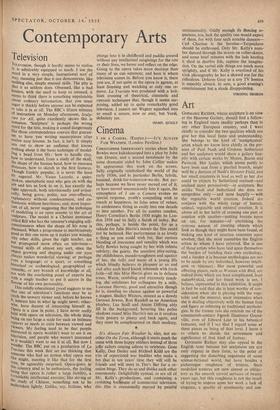Cinema
I AM A CAMERA. (Empire.)—IT'S ALWAYS FAIR WEATHER. (London Pavilion.) CHRISTOPHER ISHERWOOD'S stories about Sally Bowles were kaleidoscoped into a play by John van Druten, and a second instalment by the same dramatist aided by John Collier makes its appearance this week on the screen. Sally originally symbolised the world of the early 1930s, and in particular Berlin, febrile, haunted, drink-for-tomorrow-we-die. But per- haps because we have never moved out of it, or have moved unconsciously into it again, the atmosphere of 1 am a Camera evokes no special response, youth's compelling wish to snatch at happiness, its false sense of values, its aimlessness fitting as easily into one decade as into another. For all its sombre touches, Henry Cornelius's Berlin 1930 might be Lon- don 1950 and its Sally a Sarah of today. But this, perhaps, is beside the point, for as a vehicle for Julie Harris's talents the film could not be bettered. Her performance is as lovely a thing as you could wish for, that curious blending of innocence and venality which was Sally Bowles being caught by her with infinite subtlety; the gaiety, the ceaseless play-acting, the childishness, pseudo-toughness and squalor of her, the folly and waste of a young life which blindly belieyes in pleasure as an end ;Ind after each hard knock rebounds with fresh faith—all this Miss Harris gives us in delicate tones. Warm, confiding and extremely touch- ing, she outclasses her colleagues by a mile, Laurence Harvey, good and attractive though he is, standing no chance against so powerful a magnet. Shelley Winters, miscast as a dowdy German Jewess, Ron Randell as an American playboy, Lea Seidl and Anton Diffring ably fill in the background, hovering like polite shadows round Miss Harris's sun as it revolves from penury to plenty and back .again, and they must he complimented on their modesty.
It's Always Fair Weather is, alas, not an- other On the Town, although it starts much the same with three happy soldiers instead of three jolly sailors coming ashore to celebrate. Gene Kelly, Dan Dailey and Michael Kidd are the trio of repatriated war buddies who make a bet that in ten years' time they will still be friends and will meet in Tim's Bar for a re- union binge. They do so and dislike each other enormously. Delightfully cynical, as are all of Mr. Kelly's productions, and containing a ravishing burlesque of Commercial television, this film is occasionally marred by painful
sentimentality. Oddly enough ifs dancing se- quences, too, lack the quality one would expect of them, for with four such notable dancers- Cyd Charisse is the heroine—Terpsichore should be enthroned. Only Mr. Kelly's num- ber danced through the streets on roller-skates, and some brief minutes with the lads hoofing it shod in dustbin lids, capture the imagina- tion. On the verbal side things are much more sprightly, and if Mr. Kelly is overfond of his trick photography he has a shrewd eye for the ridiculous. Dolores Gray as a coy TV hostess is superbly absurd. In sum, a good evening's entertainment but a shade disappointing.
VIRGINIA GRAHAM










































 Previous page
Previous page